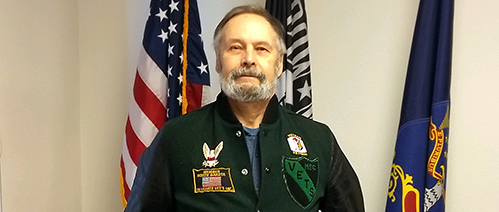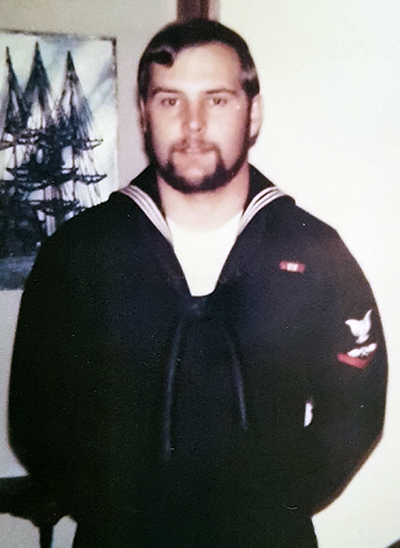Shultz: Veteran’s Club helped give needed support

By Shalom Baer
University Communication Student Assistant
publicinformation@minotstateu.edu
MINOT, N.D. – When Frank Shultz returned to the United States in 1973 after being stationed off the coast of Vietnam, he began school at Minot State to complete his degree. He was active in Minot State Student Veterans Club while attending the University.
“We used to meet twice a month — every other week we would meet on a Thursday evening — we would just discuss the things that were going on if anybody had problems,” Shultz said. “We would talk to each other. Somebody'd call up and say, ‘I'm having a really tough night,’ and you’d just keep talking to him.”
Shultz attended Minot State for two years and then earned a mechanic degree from Wahpeton State School of Science before joining the navy when he was 21. Shultz recalled the exact date: Dec. 9, 1969. He served until December of 1973 as an aviation structural mechanic on the aircraft carrier the USS Intrepid. Shultz returned to Minot State to complete a degree in accounting and economics, which is when he joined the Veterans Club. The club members faced some backlash from students and faculty members when Shultz was involved.
“I think it was it was a whole different psychological time for the population as a whole and for us veterans because this was at the time when they had all the protests. If you did happen to wear your Navy jacket, your Army jacket, your Air Force jacket and stuff, there were a number of students that would kind of come up and get in your face,” Shultz said.
 Shultz said he tried to avoid any confrontation.
Shultz said he tried to avoid any confrontation.
“You just gritted your teeth and said, ‘I'm saving your country.’ You just ignored and just tried to not deal with them,” he said. “I was doing it because I thought it was my duty to protect my country. I knew what I was fighting for.”
The move back into civilian life was a difficult journey for many veterans. One of Shultz’s friends in the club ultimately took his own life.
“He really didn’t give an outward indication that he was really suffering like that,” Shultz said. “There were a lot of guys that out-processed during a couple of weeks, maybe a month at most, and here you've got a guy that was over in Vietnam, wired to the nth degree on everything from shooting and getting shot at. Three weeks later he's standing in a department store trying to sell something to somebody. I mean, it was a tough transition for a lot of guys. There was a lot of the guys that had problems, and they hadn't diagnosed any of that stuff yet.”
Shultz said some veterans were reluctant to join the club and tried to leave their military history behind them.
“Everybody just kind of kept a low profile,” Shultz said. “We had a lot of guys that we'd talk to and see if they wanted to join the club, and basically their response was, ‘I served my time.’”
Andy Heitkamp, director of the Minot State Veterans Center, said that even today veterans can be wary to identify with their service.
“There’s lots of reasons for that. Some people don’t want their military service to define them. Some people know what they did, and don’t need anybody else to know, and then it’s just some of the stigmas and things that go with military service and the way some past people have been treated. I don’t know very many that would say they’re not proud of their service or of being a soldier or an airman. It’s that they don’t need people to know that they’re a veteran,” Heitkamp said.
According to Heitkamp, the Veterans Club on campus first became active in the mid-1960s, official on-campus assistance for veterans began in the 1990s, and is now federally mandated.
“Anybody that’s using V.A. benefits has to meet with us before they’re actually able to get their benefit. We generally have just over 200 people using educational benefits per semester, and usually an additional four to five hundred active duty guard and reserve people that are in the area,” Heitkamp said.
Beyond helping veterans navigate their benefits, the Veterans Center provides a place for veterans to spend time.
“There are people that need this place to be able to come hang out and be in a culture that they’re used to and comfortable with,” Heitkamp said. “And the way they're trained and the way they do things, you don't ask for help. It’s difficult. That's why it's important to have these types of things available.”
The MSU Veterans Center also has a POWER Center representative. The POWER Center provides academic assistance to disabled, first generation, or low-income students. The main office is in the Student Center.
“My aim and my focus in on veterans or dependents of eterans that come through (the Veterans Center), so my office is here instead of over in the POWER Center. We have a population that visits here that fall into those (categories). I can provide them extra services,” Paul Stroklund, a veteran and POWER Center representative, said. “If they’re not finding their way to the POWER Center, I can find them here. I can offer those individuals the same benefits that the POWER Center can — the extra tutors, the early registration.”
The Veterans Club is not currently active, but Stroklund said it was useful to him when he was a student.
“The one thing about the club that I saw when I was involved in it is that it helped in that transition. When you get individuals that are in the club that have already walked those steps, been through the whole process. It’s the peer-to-peer. We’re finally getting smart in the mental health and addiction and all these other things. It’s the peer-to-peer that for years and years has done it. That’s what helps somebody stay in school,” Stroklund said.
Heitkamp hopes to see the MSU Student Veterans Club revive.
“When I started in the position, we actually had another individual on campus that was the advisor for the club just to create more people and a little more exposure to do things. That ran for a couple of years, and then those people graduated, so now I'm trying to get that part going again. There are two people working on getting it started again,” Heitkamp said.
The Veterans Center is located on the first floor of Dakota Hall. Heitkamp can be reached at 701-858-4002 or by EMAIL.
About Minot State University
Minot State University is a public university dedicated to excellence in education, scholarship, and community engagement achieved through
rigorous academic experiences, active learning environments, commitment to public service, and a vibrant campus life.
Published: 03/01/19




